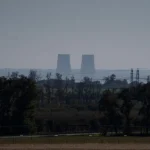
Rescue efforts are underway across western North Carolina after Hurricane Helene brought unprecedented flooding and landslides to the region over the weekend.
Deanne Criswell, Federal Emergency Management Agency (FEMA) administrator, described the catastrophic flooding as “historic” during an appearance on CBS’ “Face the Nation” on Sunday.
“I don’t know that anybody could be fully prepared for the amount of flooding and landslides that they are experiencing right now,” Criswell said. “But we have had teams in there for several days where we’re sending more search and rescue teams in there.”
North Carolina Gov. Roy Cooper said during a press conference on Sunday that the death toll of 11 was expected to rise as search teams reached areas left isolated from the storm.
“This is an unprecedented tragedy that requires an unprecedented response,” Cooper said, adding “we know there will be more” deaths.
Cooper asked residents to avoid traveling on roadways in western North Carolina to keep roads clear for emergency vehicles.
More than 50 search teams have fanned out across the region in search of stranded people.
“Many people are cut off because the roads are impassable,” the governor said.
VIDEOS: HURRICANE HELENE PRODUCES RECORD STORM SURGE ALONG FLORIDA’S GULF COAST
Supplies were being airlifted to the region around Asheville, a popular tourist city in the western North Carolina mountains.
Criswell said that water is “a big concern right now” as recovery efforts continue.
“We have sent bottled water in, but we also have the Army Corps of Engineers that’s getting ready to start assessments today to see what we can do to help get those water systems back online quickly,” she said. “And we’re also moving in, satellite communications, Starlink satellites into the area to help facilitate the lack of communication that that part of the state is experiencing.”
When asked about climate change and the storm’s impact, Criswell said that the storm intensified quickly due to warmer water temperatures.
“It’s creating more storms that are reaching this major category level than we’ve seen in the past,” she said. “It’s also creating greater amounts of storm surge in the coastal areas. It’s creating greater amounts of rainfall, as it moves up north.”
“And so in the past, when we would look at damage from hurricanes, it was primarily wind damage with some water damage,” Criswell continued. “But now we’re seeing so much more water damage. And I think that is a result of the warm waters, which is a result of climate change.”
The Associated Press contributed to this report.









